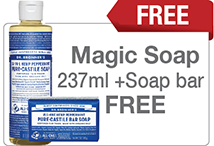Pomegranate
Updated Aug. 12th, 2019
Pomegranates are the fruit of the shrub Punica granatum, which is native to Iran and Iraq, although now it is cultivated in many arid regions around the world. The seeds of this fruit are eaten for the sweet tangy seed casings (arils). The juice from the seed casings is often extracted for its delicious flavour.
Interestingly, the grenadine syrup used in cocktails is actually concentrated and sweetened pomegranate juice. In addition to its delicious flavour, pomegranate juice also provides a number of health benefits, and pomegranate has been used in Ayurvedic medicine for thousands of years.
Traditional Uses
Traditionally, the rind of the pomegranate fruit is used in India for the treatment of diarrhea, dysentery and intestinal parasites, and modern Chinese herbal medicine uses it for these purposes as well. The seeds and the juice are used to treat heart and throat conditions and to help balance a diet high in sweet and fatty foods. The seeds and rinds were once thought to prevent conception and are still used today as a folk-remedy for family planning in some parts of Africa. Fresh and dried pomegranate seed arils are used in many Persian, Greek, and Pakistani dishes as well for their sweet, tart flavour and nutritional benefits.
Nutritional Content
Pomegranate juice contains a relatively high dose of vitamin C, vitamin B5, and potassium. The seeds within the arils also contain large amounts of fibre, and a number of fatty acids, including oleic, linoleic, palmitic and punicic acids, which may explain some of its potential cardio-protective properties.
Cardiovascular Benefits
Preliminary research has also shown pomegranate to be beneficial in reducing many of the risk factors associated with heart disease, particularly by reducing the oxidation of LDL cholesterol and by lowering blood pressure. It is also thought that the tannins present in the juice are responsible for balancing the “good” (HDL) and “bad” (LDL) cholesterol, by interfering with the oxidation of LDL cholesterol specifically. Interestingly, one human study found that pomegranate juice helped to treat carotid artery stenosis (narrowing) by reducing the thickness of the artery wall.
Antioxidant
Pomegranate juice contains a large number of different phenolic compounds that act as strong antioxidants. In fact, the antioxidant capacity (ORAC) of pomegranate has been measured as 2,860 per 100g. For more information on antioxidants and ORAC, please see our antioxidants article, here. Some scientists and health professionals believe that pomegranate may play a role in the treatment of a variety of “silent” inflammatory processes, like those involved in cardiovascular disease, diabetes and cancer.
Anti-Cancer
One of the major active constituents in pomegranate juice is called ellagic acid, which is a natural phenol compound. It acts as a strong antioxidant and has been considered a cancer-fighting agent. Ellagic acid has the ability to directly prevent the binding of carcinogenic compounds with cellular DNA in a test tube. This is the mechanism by which Ellagic acid has been thought to help prevent cancer growth. Water extracts of pomegranate rind, rich in different polyphenols, were found to promote differentiation of leukemia cells, causing them to revert to normal cells. Further research is required before we can be sure of these effects.
Supplement or Fruit?
Pomegranate fruit can be purchased at your local grocery or health food store, as can the bottled juice. Pomegranate extract can also be purchased as a supplement, in capsule form. Pomegranate extracts are usually standardized to include a certain percentage of polyphenols / ellagic acid. There is no consensus in terms of dosage or recommended juice consumption. Pomegranate juice has a very strong safety profile, and is generally considered safe. The rind should be used with caution by women who are pregnant or breast feeding.























Pomegranate is rich in the antioxidant Ellagic Acid, which isn’t really found in many other foods in such high concentrations as it is in pom. It’s hard not to like taking pomegranate if you’re using a powder or a juice form. Sometimes the whole fruit can be a lot of work to eat each day, so the supplement types make it easy to stay on your pomegranate regimen.
Hello Carol,
Indeed, the pomegranate fruit can be a lot of work to enjoy. Powdered supplements are great because you get to enjoy the flavour and also increase hydration, which along with the antioxidants in pomegranate, is great for your skin's health.
If you'd like to learn more about antioxidants, check out our article:
https://www.nationalnutrition.ca/articles/supplements/antioxidants/
Stay healthy & well!
Pomegranate is a superfood hidden in plain sight!: I’m going to have to be chirping along with the POM wonderful dolphin now. I had no idea that pomegranate had such a high ORAC value and it’s no wonder that this fruit doubles as a supplement due to its potential to fight unhealthy cell growth (ellagic acid is such a cool phenol antioxidant!!), nutritional, antioxidant, and cardioprotective roles. Thank you for opening my eyes to just how amazing pomegranate is: I certainly had been underappreciating it!
Hello Rachel,
Indeed, Pomegranate is a great superfood with POTENT antioxidant properties, which as you know are excellent at fighting free radical damage to protect our cellular health. We're glad we could help you pay appreciation where it's due ;)
If you'd like to learn what other foods have a hight ORAC value, check out our article on antioxidants: https://www.nationalnutrition.ca/articles/supplements/antioxidants/
Stay healthy & well